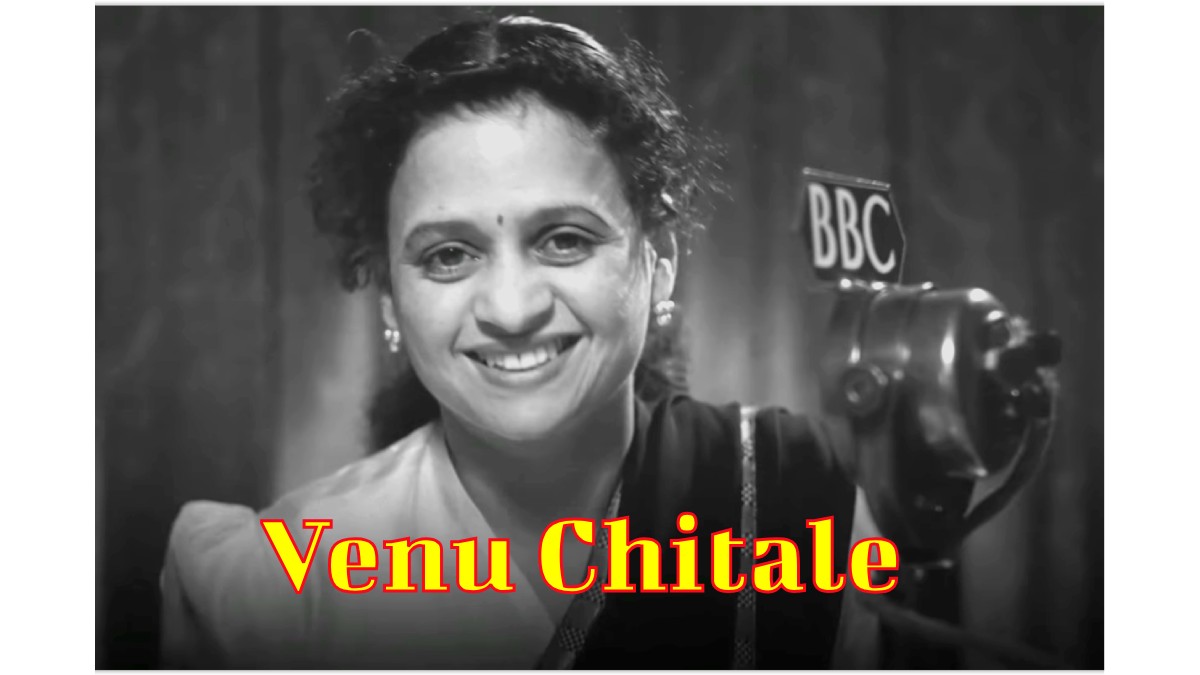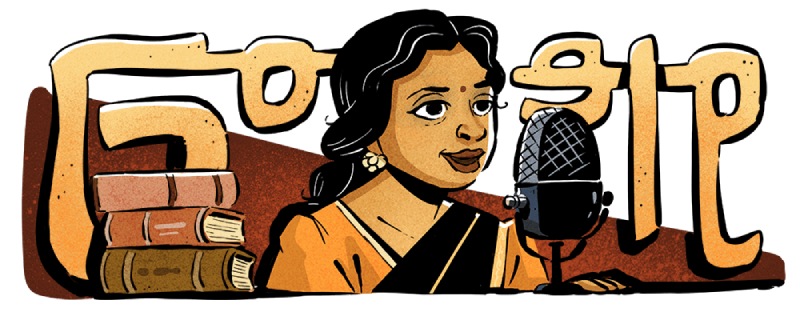Festivals & Events
Interesting Facts about Venu Chitale, an Indian Writer and Radio Broadcaster

Today’s Google Doodle honors Venu Chitale, an Indian public servant and broadcaster who is famous for being an influential radio personality in the UK during World War II. This Doodle celebrates the 111th birthday of Venu Dattatreye Chitale, an Indian writer and radio broadcaster who was among the first few Indian women hired by the BBC, George Orwell’s secretary, and an influential voice in the UK during India’s freedom movement. On December 28, 1912, Chitale was born in Maharashtra, India. Here are some interesting and fun facts about Venu Chitale.

Here is a look at the life and work of Venu Dattatreye Chitale.
Who was Venu Dattatreye Chitale?
During the early years of the Second World War, Venu Dattatreye Chitale, also known as Leela Ganesh Khare, was an Indian writer, BBC Radio broadcaster, and George Orwell’s secretary.
Quick Look
- Birth date: 28 December 1912
- Birthplace: Shirol, Kolhapur in Maharashtra, India
- Died on: 1 January 1995
- Death place: Mumbai, India
- Pen name: Weenoo
- Famous as: BBC Radio broadcaster, secretary to George Orwell
- Language: English, Hindustani, Marathi
- Education:
- Huzurpaga
- Wilson College
- University College London
- Oxford University
- Notable works: In Transit (1950)
Interesting Facts about Venu Chitale
- Venu Chitale spent the years 1934 through late 1947 in England. She was born in Kolhapur, Maharashtra, India.
- She volunteered at a local Oxford air raid precaution unit before moving to London in 1940 to work with Orwell, who was BBC Radio’s talks producer at the time.
- She started working as a broadcaster for the BBC, first for the Eastern Service’s India division, where she read news and provided recipes in Marathi, and then for the BBC Home Service, where she instructed British listeners in vegetarian cooking during the meat rationing period.
- Venu Chitale soon after took on the role of George Orwell’s secretary and worked as a translator and broadcaster for the recently established Indian Section of BBC Radio’s Eastern Services in 1940.
- Chitale skillfully incorporated commentary into her broadcasts that refuted misconceptions and stereotypes about Indians. She also often told tales that raised awareness of the difficulties faced by British women and children.
- Chitale started working for Krishna Menon at the India League in London around 1944. She went back to India after its independence toward the end of 1947 and helped Vijaya Lakshmi Pandit at the camps for refugees established in Delhi as a result of India’s Partition. In Transit, her debut book was released in 1950.
- A chapter in Marathi author Vijaya Deo’s book Sakhe Soyare describes Chitale’s life. The BBC created a video about her in 2017.
- Maharashtra, India’s Shirol, Kolhapur, is the birthplace of Venu Chitale. Her birth year is listed as 1912 in Sahitya Akademi’s Who’s Who of Indian Writers (1961) and as 28 December 1910 in the 1939 England and Wales Register.
- Maharashtra, India’s Shirol, Kolhapur, is the birthplace of Venu Chitale. Her birth year is listed as 1912 in Sahitya Akademi’s Who’s Who of Indian Writers (1961) and as 28 December 1910 in the 1939 England and Wales Register. After both of her parents passed away, she was reared by her older siblings as the second youngest of seven children.
- She first attended Huzurpaga, one of the oldest girls’ schools in Pune, then St. Columba High School in the Gamdevi neighborhood of Mumbai. She was accepted as a boarder at Wilson College, Mumbai. Chitale met Johanna Adriana Quinta Du Preez, an Afrikaaner teacher, there, and her enthusiasm for theater struck her.
- After an astrologer predicted that Chitale’s marriage would cause family problems, Chitale and Du Preez traveled to England together. After that, she enrolled at University College London, where she studied Montessori education in 1934.
- They were both attending the University of Oxford in 1939 when the Second World War broke out; Du Preez was a journalism student, and Chitale registered as an external student. She worked as a volunteer there at an air raid precaution unit, informing the populace of bomb threats and supporting rescue efforts.
- Venu Chitale started working for BBC Radio in 1940 as the Eastern Service’s India Section secretary to BBC Talks producer George Orwell, per Z. A. Bukhari’s request. Princess Indira of Kapurthala, Una Marson, Mulk Raj Anand, and Balraj Sahni were among her contemporaries there. She wrote and performed a preview of a programme every month, which Orwell edited. She also frequently read aloud translated scripts in her native Marathi.
- In 1941, Chitale appeared on two television programs. The first, “The kitchen in wartime: some suggestions for doing without meat,” featured her suggestion for a vegetarian substitute for sausage and mash.
- She also discussed what she believed an Indian housewife might make in Britain given the scarcity of ingredients and fuel. In the second program, she discussed “appetising curries.”
- Venu Chitale requested to assist Eileen Blair, the wife of George Orwell, in 1942 regarding Blair’s BBC Home Service series In the Kitchen. At a time when meat was rationed, Chitale also lectured to a British audience on the cooking show The Kitchen Front, teaching viewers how to prepare vegetarian meals. She also hosted the television show In Your Kitchen, where she provided Indians in India with recipes.
- Talking to India, written in 1943 by E. M. Forster, Ritchie Calder, Cedric Dover, Hsiao Ch’ien, and Chitale, included a chapter on the European refugee children’s exhibition. 1943 saw the publication of an ambiguous Report on Indian Programmes, which detailed her popularity among Indian listeners.
- Recalling his early years with the BBC’s Overseas Services at 200 Oxford Street when he was still in his teens, BBC producer Trevor Hill later recalled in his memoirs Over the Airwaves that “the person I knew best and enjoyed working with was a diminutive, cheerful young Indian woman from Poona, Venu Chitale.” He once played her broadcast from start to finish without realizing she didn’t know Marathi.
- Chitale started working for Krishna Menon at the India League in London around 1944. It was there that she met Vijaya Lakshmi Pandit. At the time, Bhicoo Batlivala, Ellen Wilkinson, and Aneurin Bevan were also members. She was chosen to join The Asiatic Society as well.
- She traveled to Hyderabad, India, in 1945 to attend the eighteenth All India Women’s Conference, which took place from December 28 to January 1, 1946. There, Sarojini Naidu gave her an introduction. She discussed the lack of interest in India that she saw in England and advised Indians to acquire as many Indian languages as they could to promote greater unity.
- On December 4, 1947, Venu Chitale sailed aboard the RMS Empress of Australia from Liverpool to Bombay. She helped Pandit that year with women and children who were refugees in the Delhi camps after India’s Partition.
- Her first book, In Transit, about three generations of an Indian family during the interwar period, was published in 1950. Preface written by Anand.
- She married chartered accountant Ganesh Khare in that same year, taking on the name Leela Ganesh Khare. Their daughter, Nandini Apte, was born.
- At a reception hosted by publisher Hind Kitabs in Bombay in February 1951, Chief Justice of Bombay M. C. Chagla introduced Chitale.
- In addition, Venu Chitale wrote for the Marathi newspaper Navshakti and occasionally appeared on All India Radio. She used the pen name “Weenoo” to publish Incognito, her second book, in 1993.
- In addition to her work with the BBC, Chitale was an author, activist, and humanitarian. She became a member of the India League, a London-based group that promoted the nation’s independence and self-government, in 1944.
- She came back to Bombay three years later to assist with the care of refugees from the Partition of India who were housed in camps in Delhi. She also began writing novels about Indians’ experiences during the interwar period in 1950.
- Venu Chitale died on January 1st, 1995. Her life story is told in a chapter of Vijaya Deo’s Marathi novel Sakhe Soyare.
- Chitale achieved several accomplishments throughout her life that demonstrated her commitment to public service. She overcame numerous obstacles and lived an unusual but inspirational life, ultimately contributing to India’s independence.
- The BBC created a video about her in 2017. In honor of Venu Chitale’s 111st birthday, a Google Doodle was created on December 28, 2023.
-

 Gadget4 weeks ago
Gadget4 weeks agoAfter Grand Success on BLDC Ceiling Fan, Eff4 Is Launching Smart Bulb
-

 Festivals & Events4 weeks ago
Festivals & Events4 weeks agoGoogle Celebrates Cherry Blossom Season with Animated Doodle
-

 Business2 weeks ago
Business2 weeks agoPrakash and Kamal Hinduja: Driving Social and Environmental Change
-
Education3 weeks ago
Fred DuVal: University Leadership as a Critical Resource for Climate Change Research and Life-Saving Solutions
-

 Health2 weeks ago
Health2 weeks agoThe Hinduja Brothers Commitment to Global Health: Empowering Communities Across Borders
-

 Cryptocurrency3 weeks ago
Cryptocurrency3 weeks agoDesigned For The Masses: How Akasha (AK1111) Is Unlocking Crypto For The Next Billion Users
-

 Cryptocurrency3 weeks ago
Cryptocurrency3 weeks agoNexaglobal & Future World Token (FWT): Could This Be the Next Big Crypto Investment of 2025?
-

 Sports4 weeks ago
Sports4 weeks agoWomen’s NCAA Tournament 2025 Sweet 16: Full Schedule, Fixtures, Teams, Bracket, and How to Watch March Madness Basketball Match Live























